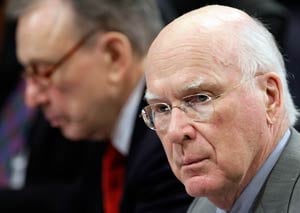 The Senate Judiciary Committee is holding a hearing today on the ability of federal law enforcement to go after financial fraud -- or, inability, according to two of the hosts, Senators Patrick Leahy (D-VT) and Chuck Grassley (R-IA).
The Senate Judiciary Committee is holding a hearing today on the ability of federal law enforcement to go after financial fraud -- or, inability, according to two of the hosts, Senators Patrick Leahy (D-VT) and Chuck Grassley (R-IA).
Their little-noticed announcement last week of a multipronged anti-fraud bill made some sobering claims about how investigators and prosecutors have been hampered by inadequate resources and laws, particularly in the area of mortgage fraud. But some who have followed the feds’ response to the financial meltdown warned that increasing criminal penalties will not solve the day-to-day dangers facing consumers and that expansion of federal criminal laws carries its own risks.
The FBI, the senators said, has 250 agents handling fraud caseloads that have doubled since 2005 as well as a ten-fold increase in mortgage-fraud allegations referred by the Treasury Department -- from 5,400 in 2002 to 60,000 in 2008. At present the FBI “cannot even begin to investigate” all the possible frauds it hears about, said Sen. Leahy in a press release.
Statutes criminalizing certain types of lending fraud -- including bribery, false statements and conspiracies -- currently don’t apply to private mortgage companies that are not affiliated with federally regulated banks, the senators said. “These companies,” such as the scandal-plagued Countrywide Financial before its July 2008 acquisition by Bank of America, and GMAC Mortgage, “were responsible for nearly half the residential mortgage market before the economic collapse, yet they remain largely unregulated and outside the scope of traditional federal fraud statutes,” Leahy said.
The proposed Fraud Enforcement and Recovery Act would provide some $500 million over the next two years for expanding anti-fraud personnel, mainly at the Justice Department. It would expand federal criminal statutes dealing with lending and securities fraud to cover more mortgage brokers and companies and mortgage-backed securities. Another provision would make a crime of frauds against the government worth over $1 million of “federal assistance” funds from the bank bailout and pending stimulus package.
Asked for examples of frauds that could not be prosecuted by the feds without the proposed changes, Leahy’s Judiciary Committee spokeperson, Erica Chabot, said she couldn’t offer any specifics. Justice Department spokesperson Ian McCaleb said he couldn’t comment on whether legal limitations have hamstrung fraud prosecutions, nor would he provide numbers on existing cases.
An October analysis by the Transactional Records Access Clearinghouse at Syracuse University counted 151 federal criminal mortgage fraud prosecutions in the first ten months of fiscal year 2008. Comparing the number to drug possession and wildlife protection cases over the same period, the TRAC report found the “relatively small number” of mortgage fraud cases to be “somewhat surprising.”
Chabot said generally that the proposed measures would “help facilitate prosecution,” for instance of “some of those brokers that give fraudulent information to lenders.”
In January, the Mortgage Asset Research Institute, a mortgage-industry consulting firm, said fraud by loan officers and brokers -- usually misrepresenting borrowers’ income or employment -- had risen 45 percent from 2007 to 2008.
Such conduct is already well covered by federal and state statutes, said Jack King, communications director for the National Association of Criminal Defense Lawyers. If the Leahy-Grassley proposal means to impose federal criminal penalties for strictly local conduct, he said, that is the federal government overstepping its constitutional bounds.
He warned against more efforts to “throw people in prison,” where the aim is to restore money to victims or prevent public harms to begin with. “There is a difference between bad business practices and criminal conduct,” he said. The lawyers’ group is preparing a letter to Leahy and Grassley opposing their proposed expansion of the federal criminal code.
Ellen Podgor, a white-collar crime specialist at Stetson University College of Law, said existing laws enabled more than adequate punishments. She has blogged about the 30-year federal sentence, which she calls “appalling,” for one first-time mortgage-fraud offender.
She said increasing criminal penalties is “using a hammer to hit the wrong nail. Front-end deterrence is needed, but this is back-end deterrence.”
Kirsten Keefe, a consumer-law expert with Empire Justice Center in upstate New York and advisor to the Federal Reserve Board, said that “most of the practices the subprime mortgages world has engaged in are not necessarily illegal.” She said that reforms to guarantee fair lending practices from the outset -- such as prohibiting broker incentives to sell unnecessarily high-interest loans and limiting risky adjustable-rate mortgages -- would most effectively protect the public.
No one disagreed that greater investigative resources would be a plus. William Carter, a spokesperson for the FBI, agreed with Leahy’s estimate that some 250 agents currently work on mortgage fraud. He said that, in addition, the agency participates with state and local law enforcement in 42 mortgage fraud task forces around the country. He said some fraud allegations go unaddressed, with U.S. attorney thresholds for big-money cases driving priorities.
He didn’t dispute reports, for instance by the Seattle Post-Intelligencer, that FBI resources had been diverted to other causes during the time that mortgage fraud became widespread. “We had a little incident back in 2001, which caused a big change in allocation of resources. We needed financial investigation resources for counterterrorism operations.”
He said policy priorities seemed to be shifting, and that there was a new focus on preventing fraudulent use of bailout and stimulus funds. “Best estimates are, close to 20 percent of any stimulus package may involve fraudulent activity,” he said.



